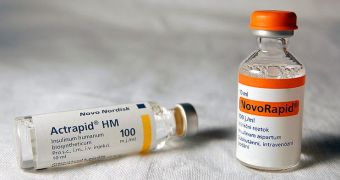It's no longer a secret to anyone that people are sicker now than they were but a few decades ago. Obese and overweight individuals have become the rule, rather than the exception, and the trend appears to be accelerating. But, while one may argue that everyone should be free to do whatever they want with their own bodies, there is also the issue of public health. Unhealthy weight can also promote the development of type II diabetes, and also the emergence of various diseases of the heart. In a recent study, researchers found that one of the most common side-effects of obesity – inflammation – can be fought by administering insulin.
As an added benefit, the team behind the work says, this also reduces a person's risk of developing diabetes. The remarkable finding was recently presented in a new thesis, written by experts at the Sahlgrenska Academy of the University of Gothenburg, in Sweden. “It’s still not entirely clear why obesity causes insulin resistance. Inflammation could be part of the reason why obesity leads to type 2 diabetes,” explains University of Gothenburg Institute of Medicine expert Emelie Wallerstedt.
Fat accumulations work insidiously towards opening the way for diabetes to develop. As additional fat tissue is formed, it begins producing inflammatory agents, which leave the surrounding areas in a state of constant inflammation. As this happens, the body becomes unable to regulate the level of sugar in the bloodstream using the hormone insulin. Researchers say that this is one of the main mechanisms through which insulin resistance – the precursor of diabetes – forms. Once the resistance increases above a certain threshold, the full-blown disease develops.
In the thesis, experts supply new data on the role of excessive fat tissues. They say that numerous chemicals are produced within, which means that the deposits are not simply storage rooms for fat cells, but actually active chemical manufacturers. One of the preeminent agents produced in fat tissues is the inflammatory molecule IL-6. It “impairs insulin signaling, but the insulin signaling itself can also inhibit and ‘turn off’ the IL-6 signal and inflammation. The protein PKCdelta also plays an important role in the regulation of the IL-6 signal, and we have shown that if we disable the function of this molecule, the inflammation decreases,” adds Wallerstedt, quoted by AlphaGalileo.

 14 DAY TRIAL //
14 DAY TRIAL //